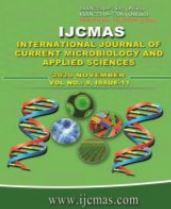


 National Academy of Agricultural Sciences (NAAS)
National Academy of Agricultural Sciences (NAAS)

|
PRINT ISSN : 2319-7692
Online ISSN : 2319-7706 Issues : 12 per year Publisher : Excellent Publishers Email : editorijcmas@gmail.com / submit@ijcmas.com Editor-in-chief: Dr.M.Prakash Index Copernicus ICV 2018: 95.39 NAAS RATING 2020: 5.38 |
Indian farming has been suffering due to indiscriminate application of chemical fertilizers and pesticides and due to lack of farm based integrated farming based interventions. Further, the monocropping pattern also one of the major factors that have contributed for disinterest and apathy among farmers. The indiscriminate increase in cost of production, lack of assured market, price fluctuations and fragmentation of land holdings, timely non availability of critical inputs and also decline in soil productivity due to lack of science and technology inputs in farming system are the serious concerns which affects farmers’ economy. This has resulted in loss of soil fertility, productivity of crops as well as hazards to human health. According to the feedback from several quarters, farmers in general and farm youth in particular, are losing confidence in farming. More than 40 per cent of farming families want to leave farming in India. In a progressive state like Punjab also where the farmers are relatively well assured with resources compared to majority of other states in the country farmers are losing their confidence in farming. Therefore, it is difficult to imagine the mindset of farmers in other parts of the country. The situation is more or less same in many developing as well as few developed countries. Therefore, a network project was undertaken with the support of the Department of Biotechnology, Government of India on establishment of rural bio-resource complex in North Bengal implemented by University of North Bengal and Uttar Banga Krishi Viswavidyalaya in seven districts viz, Darjeeling, Jalpaiguri, Cooch Behar, Alipurduar, Uttar Dinajpur, Dakshin Dinajpur and Malda in West Bengal State. By understanding the importance of organic farming and introduction of high value crops, interventions on mushroom cultivation, aquaculture and solid waste management were taken up in the districts benefitting more than 2000 farmers including Self Help Groups. The details have been highlighted in the paper.
 |
 |
 |
 |
 |